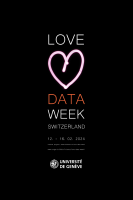
Love Data Week 2024
12.02.2024 – 16.02.2024
Organisé par
Division de l'information scientifiqueBibliothèque de l'UNIGE
entrée libre
Plus d'infos
Contact: missing email
Sous-événements
Research Data Licensing, in 15 minutes
12.02.2024 13:00 – 13:15
Rendez vous de l'information scientifique, in English, on registration. Objective: Choosing a Creative Commons license for the dissemination of your research data, while encouraging its reuse and respecting copyright. Description: This short presentation will present what kind of research data are protected by copyright in Switzerland. It will also provide recommendations on how to choose a Creative Commons license for data, especially in an open data perspective. Program: Copyright in Switzerland and research data Notion of open license for data Creative Commons licensing recommendation for data
Introduction aux données de recherche : Bien gérer vos données
13.02.2024 14:15 – 15:00
Rendez-vous de l'info scientifique Sur inscription Objectif : Le concept de « données de recherche » vous semble flou ? Vous peinez à savoir ce qui peut être qualifié de donnée de recherche parmi les éléments de votre recherche ? Cette séance introductive vous donnera les éléments de base pour vous permettre de reconnaître les données de recherche et de savoir comment les gérer efficacement dès le début de votre recherche. Description : Définir les données de recherche Distinguer les différents types de données de recherche Différencier les différentes étapes du cycle de vie des données de recherche Identifier les avantages et les outils d'une bonne gestion des données de recherche
Demonstration of eLabNext system used by the Faculty of Medicine (UniGe) laboratories to manage their data
13.02.2024 15:15 – 16:00
In September 2020, the Faculty of Medicine (UniGe) initiated the SmartLab project with the aim to implement a LIMS for their research groups. Three years later, 50% of our laboratories are using eLabNext, the system selected and supported by the Faculty. We are glad to present this tool and answer your questions about this project.
Data Papers, Data statements: how to visibilize the work you've invested in your data
14.02.2024 09:00 – 09:15
Rendez vous de l'info scientifique, in English, upon registration Objectives: - Understand what are Data Statements, and how to write a good one. - Understand Data Papers' specificities and the logic behind this type of articles Description: In the context of open research data, we invite you to familiarize yourself with Data Statements & Data Papers. The first ones are included in traditional scientific publications and give additional information regarding the availability of the underlying data, while the second ones are specific publications intended to highlight and document a dataset published somewhere online. Program: Introduction on why and how to publish your data ? What are Data statements & papers ? How are both structured ? Some practical examples
Managing your research data in accordance with the FAIR principles, in 15 minutes
15.02.2024 09:00 – 09:15
Rendez vous de l'info scientifique, in English, upon registration. Objective: To improve the visibility, accessibility and reuse potential of your research data by applying the FAIR principles. Description: The FAIR Principles are good practices for the optimal dissemination of research data, ensuring its visibility, discoverability and reusability. More and more funders and institutions expect researchers to follow these principles when disseminating their research data. Contents: presentation of the FAIR principles requirements of funders and the UNIGE in this area resources to check if your data are FAIR compliant
SNSF Data Management Plan (DMP): How to fill it and what information to include?
16.02.2024 09:15 – 10:45
Rendez vous de l'info scientifique, in English, upon registration Goal: Analyze the key elements of the data management plan (DMP) required by the Swiss National Science Foundation (SNSF) Description: From now on, the SNSF requires a data management plan (DMP) for each accepted project. It is a requirement of the CUREG, too. During this workshop, you will see what are the requirements from the SNSF and how to fill the DMP. Program: Questions from the DMP of the SNF are adressed, with the help of use-cases.

 haut
haut